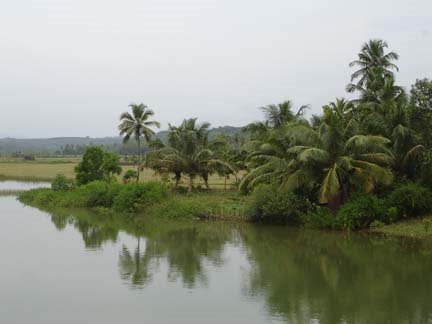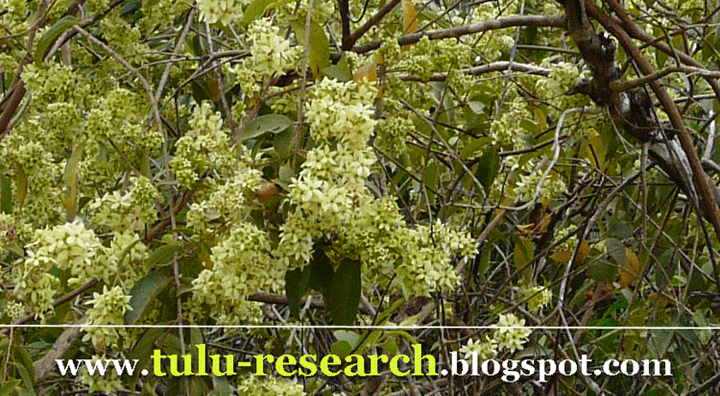Antiquity of the Siri paDdana dates back to the period of Tamil Sangham literature. There are several Pali proper nouns in the Siri paDdana that show the backdrop of Buddhism during the composition of the oral epic. Buddhist elements have also been recognized in the environs of Tamil Sangham. The word Sangham (=association) itself is a word associated with Buddhism.
Tulu Sangham
Analogy between the Siri paDdana and the story of Kanaki in Sangham literature suggests that both epics were two different regional versions been built on the same story element. As noted by Peter Claus “there are some tantalizing similarities between the Siri cult and that of Pattini, and also between the Siri legend and that of Kanagi (Pattini)”.The similarity of story element in the Sangham Kanaki and Tulu Siri, leads us to conclude that the composition of Siri paDdana was contemporary of Tamil Sangham literature.
This leads us to visualize a period of an oral tradition of literary association that flourished for some time before Christ in Tulunadu that can be designated as Tulu Sangham. The Tulu Sangham tradition apparently added subsequent sequels in the due course like (a) Abbaga-Daraga and (b) Mayaga-Maipage to the original Siri paDdana by different bards. Minor contradictions in the different sequels possibly point to compositions by different bards at different times.
Sonne and others
Sonne is the name of daughter of Siri, the tragedy heroine. The meaning of Sonne is not zero! Sonna means gold in Pali language. The Hindi Sona and Sanskrit Suvarna are related to this word. Similarly, the proper names like Mayage (<=Mayakka), Maipage (Mayi-page) suggest Buddhist influence during the composition, the Maya(devi) being the name mother of Gautama Buddha. Even,the place names Lokanadu or Lankanadu evince Buddhist flavours. Other proper nouns Gindi (=bronze kettle type of vessel), Abbaga (=constellation of Krittika), Daraga (=constellation of Mrigashira) are not found in common Pali names and may be the usual Tulu female names in usage at that time. The usage of (male) period surnames in the paDdana like Alva, Ballaveru, Marla and Thola needs further analysis.
Chenne, the game
The word chenne is derived from the Pali word that means to relish, but the game and the cult evidently has been imported by the Tulu immigrants. Folklorist Peter Claus concludes that many of the elements found in Tulunad were imported along with the game as sort of historical baggage. The earliest representation of the game in Egypt would suggest that the game originated in the Middle East and traveled along trade routes even before Christ. The game symbolizes intelligence and cunningness and is played among peers. In India and Africa the game is represents rites connected with puberty and marriage.
Bermer
Though Pali words connected with Buddhism make interesting backdrop in the Siri paDdana, the ruling deity is Bermer, the ancient spirit God of Tulu people. The Shiva and Parvathi appear as characters in a sequel of the PaDdana, but there is no indication of their worship. Possibly the Siri PaDdana predates the period of initiation of Shiva worship.
The chief character of the paDdana, the landlord of Satyanapura is also called ‘Berma’ Alva .or ‘Berma’ Ballaveru in a sequel. Initially, he is issueless and the suggestion he gets is that his problem would be resolved if he arranges for the renovation of Bermer shrine.
Time and Tides
This leads us to interpret that Bermer worship was grossly neglected during the ascent of Buddhism in Tulunadu. The initial Buddhism being a religion without Gods, the people neglected the cult of Bermer and spirit worship that was prevalent among them. The bards of Tulu Sangham contemplated to revive the neglected Bermer worship on the wake of ascent and spread of Buddhism in the region. The story of Siri paDdana revolves around adultery and prostitution that was the major concern of thinkers of that period. Apparently, to discourage women pursuing paths of adultery, like their errant husbands, the bards poetically conceived special dignity and powers (to curse or bless) to women following paths of disciplined life.
®
.
Subscribe to:
Post Comments (Atom)
Blog Archive
Books for Reference
- A Comparative Study of Tulu Dialects By Dr. Padmanabha Kekunnaya. Govinda Pai Reserach Centre, UDupi. 1994
- Koti Chennaya: Janapadiya Adhyayana. By Dr. Vamana Nandavar. Hemanshu Prakashana ,Mangalore.2001.
- Male kudiyaru. Dr B. A.Viveka Rai and D.Yadupathi Gowda, Mangalore University,1996.
- Mogaveera Samskriti By Venkataraja Punimchattaya. Karnataka Sahitya Academy.1993.
- Mugeraru:Jananga Janapada Adhyayana. By Dr Abhaya Kumar Kaukradi.Kannada & Culture Directorate,Bangalore & Karnataka Tulu Academy, Mangalore,1997.
- Puttubalakeya Pad-danagalu. Ed: Dr B.A.Viveka Rai,Yadupati Gowda and Rajashri, Sri Dharmasthala Manjunatheswara Tulu Peeta. Mangalore University.2004
- Se'erige. Ed:Dr K.Chinnapa Gowda.Madipu Prakashana,Mangalagangotri,2000.
- Studies in Tuluva History and Culture.by Dr P Gururaja Bhat (1975).Milagres College,Kallinapur,Udupi.
- Taulava Sanskriti by Dr.B.A.Viveka Rai, Sahyadri Prakashana,Mysore 1977
- TuLu naaDu-nuDi By Dr.PalthaDi Ramakrishna Achar, Puttur.
- TuLu NighanTu. (Editor in Chief: Dr U.P.Upadhyaya, Govinda Pai Research Centre,Udupi. Six volumes. 1988 to 1997
- Tulu Patero-A Philology & Grammar of Tulu Language by Budhananda Shivalli.2004.Mandira Prakashana Mangalore. p.317. (The book is in Tulu Language using Kannada script)
- TuLunadina ShasanagaLa Sanskritika Adhyayana. By Shaila T. Verma (2002) Jnanodaya Prakashana,Bangalore, p.304.(Kannada)
- Tuluvala Baliyendre. Compiled by N.A.Sheenappa Hegde,Polali,Sri Devi Prakashana,Parkala,1929/1999
* Landscape images *
A Coastal estuary

Holegadde near Honavar,Uttara Kannada dist, Karnataka
Copy? Right - but kindly remember to acknowledge!
" tulu-research.blogspot." ತುಳು ರಿಸರ್ಚ್. ಬ್ಲಾಗ್ಸ್ಪಾಟ್. ಇನ್

Have a nice day !

No comments:
Post a Comment